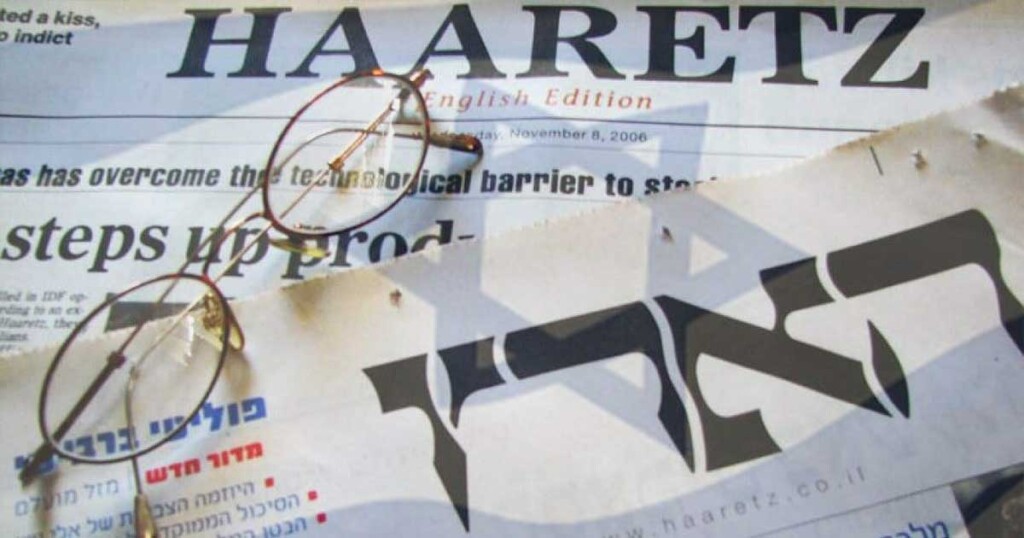It is enough to look back and note that it is astonishing how much time it took for the final decision to be made: the Israeli government announced it, and media and journalist associations across the West unanimously mourned the “boycott” of the country’s oldest newspaper – which, by the way, still exists – Haaretz. An unprecedented blow to press freedom in Israel and yet another undeniable proof of the growing surge of right-wing radicalism within Netanyahu’s government.
AMOS’ MISSTEP
Earlier, at a newspaper conference held in London, editor Amos Schocken accused the Israeli government of establishing a “cruel apartheid system” and slandering “freedom fighters” by comparing them to terrorists. Schocken later apologized, stating that the analogy with terrorists had nothing to do with Hamas; even his co-owner, liberal Russian-Jewish oligarch and Khodorkovsky confidant Leonid Nevzlin, distanced himself from him, and the number of subscribers had already started to dwindle.
Shortly thereafter, at the end of November, Minister of Communications Shlomo Karhi (Likud) presented a proposal to the cabinet (unanimously accepted) to stop giving interviews to Haaretz and to prohibit ministries from advertising in the newspaper. All ministries also canceled their subscriptions, including the Ministry of Foreign Affairs, which had until then purchased 90 copies.
This is not the first time the Israeli government has publicly opposed Haaretz (which, by the way, was for years owned by German shareholders, namely the DuMont group); even politicians from the Social Democratic Labor Party had in the past criticized the newspaper’s radical leftist positions. Haaretz has been pushed to the margins in Israel – the Labor Party has not won a parliamentary election since 1999 and later barely managed to surpass the 3.25% threshold. Now, it is in coalition with the Greens (with no parliamentary representation). According to the latest polls, this alliance stands at around 8%.
RELIGIOUS RIGHT WORSE THAN HEZBOLLAH?
The fact that this so-called boycott is portrayed as a coordinated restriction on press freedom echoes the campaign in which Orbán was systematically vilified as a dictator, even though Hungarians undoubtedly enjoy far greater freedoms than in most Western European countries. Even in a democratic country, the government is by no means obliged to place ads in newspapers at state expense – regardless of how authoritative these newspapers are considered abroad.
Haaretz’s reputation, which also publishes a weekly English edition, was primarily built on the fact that for decades it was the main source for leftist journalists worldwide, providing them with information about Israel, often because they did not know Hebrew. Since these journalists received exactly what they wanted, the newspaper was consequently praised as Israel’s supposedly “leading media outlet” – although this can no longer be said by any measure.
If it garnered national attention, it was due to the obvious controversies it stirred or its anti-Israeli polemics. Even the newspaper’s former chief editor, Hanoch Marmari, believed that Haaretz had completely lost touch with the reality of Israeli life. In 2017, the paper’s editor stated that Israel’s religious right was worse than Hezbollah.
A FAVORITE AMONG ARABS
What particularly represents Haaretz is its most famous figure, columnist (and sometimes deputy editor-in-chief) Gideon Levy (born 1953), who lives in the northern part of Tel Aviv (arguably the most expensive district in the country). This makes the reality of his compatriots – such as living in close proximity to Arabs (none of whom reside in northern Tel Aviv) – something he knows only second-hand. If you are not already familiar with this extremely stubborn and intolerant yet hopelessly unrealistic breed of Israelis, similar to those from Prenzlauer Berg, for example, you should read the novel “Itamar K.” by Iddo Netanyahu, the Prime Minister’s brother, which targets such Israelis (soon to be available in Serbian).

In any case, Levy has never tired of accusing his own country of colonialism, racism, even “apartheid” and “ethnic cleansing” – all over the span of about 25 years. He talks, for example, about the “brainwashing” that children in Israeli schools are exposed to (even though Arab school textbooks deny Israel’s right to exist and glorify the killing of Jews). He also calls for greater tolerance toward illegal African refugees and even supports the BDS movement, which advocates not only economic but also academic and cultural boycotts of his homeland. Levy’s articles are so popular among Arabs that in the past they have even been translated into Arabic and published on Hamas’ website.
LEVY (STILL) AT WORK
In a notorious 2010 interview with the left-wing, anti-Israeli Independent, Levy uttered the immortal thought: “Israel complains that Hamas hides behind civilians, but our Ministry of Defense is also in Tel Aviv.” He argued that Arab civilians killed during the 2009 Gaza war barely occupied space in Israeli media, while “a dog was mourned on the front page of Israel’s most popular newspaper – an Israeli dog – killed by a Hamas Qassam rocket.”
The only problem was that such a front page never existed. Contrary to his notorious and pathetic self-proclamations, Levy is not at all concerned with “preventing” his compatriots from making mistakes out of “patriotic” zeal. On the contrary, it appears that Levy invented the dog story to tell Israel’s non-Jewish enemies what they always believed they knew.
Criticism of Levy’s reliability is by no means limited to the Israeli right; journalist Ben-Dror Yemini from the centrist daily Maariv noted in 2010 that Levy had become a “baron of the industry of lies”: “His web of lies even makes Pravda appear to be serious, reliable news.” Yet, even Yemini stated, “I am proud to live in a country where Gideon Levy is allowed to publish.”
FIVE JEWS – TEN OPINIONS
Even now, Levy can continue publishing whatever he wants. He is also allowed to receive public service awards, such as the Sokolov Journalism Award recently given by the city of Tel Aviv. He will simply no longer be able to conduct interviews with government officials (something he hasn’t done for decades, as only right-wingers have won elections), and he may have to settle for a slightly lower salary at Haaretz, as government advertisements will cease. This is good news because Israeli taxpayers will no longer have to pay for insults.
There are nations where, even under conditions of near-ideal freedom of thought and press, the need for harmony and consensus is widespread, and contradiction is considered unacceptable; unfortunately, Germans have too often shown that they belong to such nations. However, there are also nations where people are constantly at odds – even under royal rule.
Jews belong to the latter. Hence, there is no reason to worry about freedom of expression in Israel. As the joke recently shared by Michael Klonovsky goes: “Five Germans – one opinion. Five Jews – ten opinions.”





